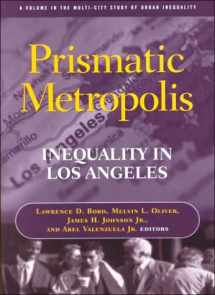
Prismatic Metropolis: Inequality in Los Angeles (Multi-City Study of Urban Inequality)
Book details
Summary
Description
This book cuts through the powerful mythology surrounding Los Angeles to reveal the causes of inequality in a city that has weathered rapid population change, economic restructuring, and fractious ethnic relations. The sources of disadvantage and the means of getting ahead differ greatly among the city's myriad ethnic groups. The demand for unskilled labor is stronger here than in other cities, allowing Los Angeles's large population of immigrant workers with little education to find work in light manufacturing and low-paid service jobs.
A less beneficial result of this trend is the increased marginalization of the city's low-skilled black workers, who do not enjoy the extended ethnic networks of many of the new immigrant groups and who must contend with persistent negative racial stereotypes.
Patterns of residential segregation are also more diffuse in Los Angeles, with many once-black neighborhoods now split evenly between blacks, Hispanics, Asians, and other minorities. Inequality in Los Angeles cannot be reduced to a simple black-white divide. Nonetheless, in this thoroughly multicultural city, race remains a crucial factor shaping economic fortunes.
A Volume in the Multi-City Study of Urban Inequality


We would LOVE it if you could help us and other readers by reviewing the book
Book review



